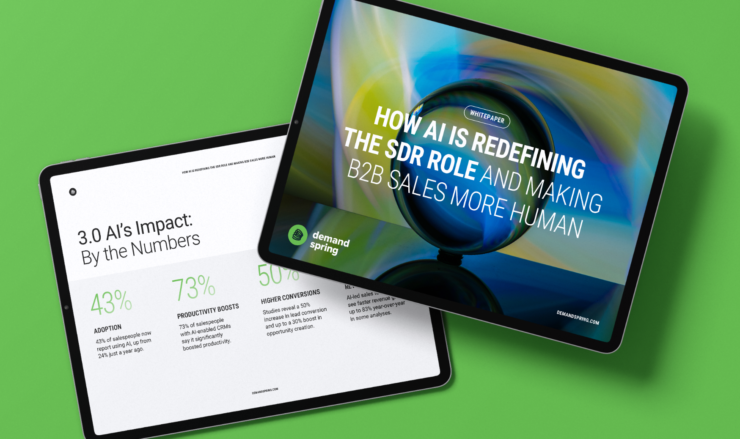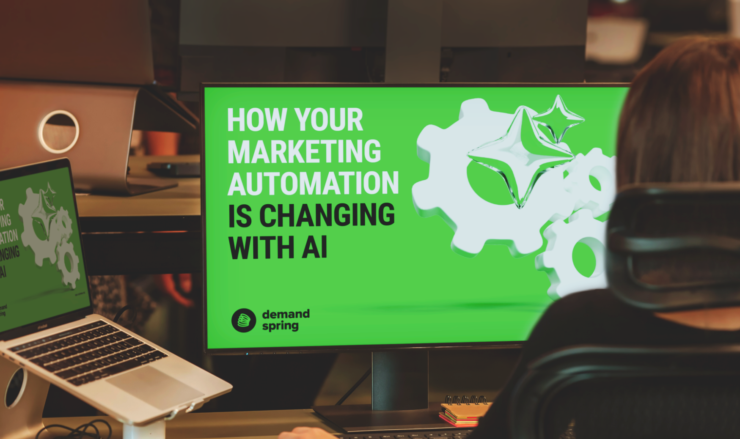As B2B Marketing 2025 approaches, the B2B marketing landscape is set for transformative growth. From advancements in artificial intelligence to shifts in budget priorities, this year will redefine how businesses engage their audiences and achieve ROI. Here are 10 bold predictions that will shape the future of B2B marketing in 2025.
1. Visionary CMOs Will Harness AI for Organizational Transformation
In 2024, AI saw widespread experimentation across marketing teams. While many companies played with generative AI for content creation, visionary CMOs in 2025 will move beyond isolated use cases to focus on organizational transformation initiatives.
These leaders will integrate AI into the core of their strategies, driving efficiencies, uncovering new opportunities, and reshaping workflows. Expect to see visionary CMOs invest significantly in all three pillars of their organization’s operating model:
- People: Upskilling and reskilling their marketing talent to be comfortable, confident, and curious in using AI every day
- Process: Reshaping marketing processes to take advantage of AI’s workflow automation and AI agents to reduce manual processes and break down silos across marketing
- Technology: Aligning AI technology investments to marketing priorities to accelerate competitive advantage
2. CFOs Will Loosen the Purse Strings
After two years of conservative budgets, 2025 will bring a renewed commitment to marketing investments. CFOs, now seeing evidence of AI’s ability to drive measurable results, will begin to increase marketing budgets.
According to recent industry surveys, the companies poised to benefit most from this budgetary easing are those that can directly tie marketing efforts to revenue growth. Expect larger investments in demand generation, marketing technology, and high-value content strategies as organizations aim to accelerate their growth trajectories.
3. Adobe Journey Optimizer Will Thrive in B2B Marketing
Originally popular in the B2C space, Adobe Journey Optimizer (AJO) is set to make significant inroads into B2B marketing in 2025. Its ability to deliver real-time, personalized customer journeys across channels will resonate with B2B organizations seeking to enhance their account-based marketing (ABM) and nurture programs.
With B2B buyers demanding experiences akin to B2C, AJO’s predictive capabilities and integration with Adobe’s broader suite will become indispensable for enterprises aligning their Revenue Marketing strategies to buying groups.
4. Employee Upskilling, ABM, and Content will be the 3 biggest AI focus areas for enterprise marketers
CMOs will double down on AI-focused initiatives that deliver tangible results. The top priorities will include:
- Employee Prompt Training and Upskilling: Empowering marketing teams to effectively use generative AI tools through targeted training programs will enhance productivity and creativity. Upskilling will also be prominent in areas such as how to apply AI in areas such as SEO in an LM world, and precision ABM with AI.
- AI-Powered Precision ABM Efforts: AI will play a critical role in refining account selection, crafting hyper-personalized messaging, and optimizing campaign timing to engage high-value accounts.
- Content Marketing at Scale: Generative AI will enable the production of tailored content for various buyer personas, accelerating the content marketing cycle while maintaining quality.
5. AI Will Augment SDRs for Higher Performance
Key areas of impact include:
- Intelligent Lead Prioritization: AI will analyze large datasets to identify the highest-potential leads, helping SDRs focus their efforts where they are most likely to succeed.
- Enhanced Personalization: AI-driven insights will allow SDRs to craft hyper-relevant outreach messages, leveraging context from past interactions, social media, and CRM data to build rapport quickly.
- Automated Routine Tasks: SDRs will save hours by using AI to automate data entry, meeting scheduling, and even first-touch outreach.
- Coaching and Performance Analysis: AI will provide real-time feedback and suggestions during calls, helping SDRs refine their pitches and overcome objections on the spot.
6. Compliance-Driven Industries Will Use AI to Streamline Processes
In highly regulated industries such as financial services and healthcare, compliance requirements have historically created bottlenecks for marketing efforts. In 2025, AI will help these industries overcome these challenges by automating compliance processes, enabling marketing teams to scale their efforts more efficiently.
AI will:
- Automate Content Reviews: AI-powered tools will review marketing materials for compliance with regulatory standards, reducing approval times from days to minutes.
- Ensure Real-Time Adherence: AI will monitor live campaigns to ensure messaging stays compliant with evolving regulations, minimizing risk and avoiding fines.
- Enable Efficient Audit Trails: AI will generate detailed, automated documentation for compliance audits, saving significant time for marketing and legal teams.
- Support Personalization at Scale: By integrating compliance rules into content-generation workflows, AI will empower marketers to deliver personalized campaigns without fear of crossing regulatory boundaries.
7. AI Agents Will Break Down Silos and Automate Manual Efforts
AI agents—advanced systems capable of autonomous task execution—will become game-changers for marketing teams in 2025. These agents will automate manual tasks, integrate workflows, and facilitate collaboration across previously siloed teams.
Key benefits of AI agents will include:
- Cross-Team Workflow Integration: AI agents will unify marketing processes across departments such as content, demand generation, and analytics, ensuring seamless execution from strategy to delivery.
- Elimination of Routine Tasks: Tasks like updating CRM systems, scheduling posts, and managing data imports will be handled autonomously, freeing teams to focus on strategic efforts.
- Data-Driven Collaboration: By continuously analyzing performance metrics and sharing actionable insights in real time, AI agents will ensure that teams across silos are aligned toward shared goals.
- Scalable Campaign Management: AI agents will manage complex, multi-channel campaigns autonomously, dynamically optimizing performance based on real-time data.
In a world where speed and agility are paramount, AI agents will provide the glue that binds marketing operations together, enabling teams to move faster, collaborate better, and achieve more impactful results.
8. Marketing Operations Executives Will Face a Pivotal Career Moment
In 2025, the role of marketing operations executives will become a make-or-break position. Those who embrace AI and lead their organizations in its strategic adoption will surge ahead in their careers. Conversely, those who fail to adapt will risk falling behind.
The key to success for marketing operations executives will be their ability to:
- Drive Strategic AI Initiatives: Executives must align AI’s potential with broader business goals, ensuring technology investments translate to measurable outcomes.
- Foster Cross-Functional AI Integration: By breaking down silos, marketing operations leaders can ensure AI-powered insights are leveraged across teams.
- Upskill and Empower Teams: Leading training initiatives to improve AI literacy across marketing will be critical for maintaining a competitive edge.
- Stay Ahead of Innovation: Keeping pace with AI advancements and identifying new opportunities to optimize workflows will set leaders apart.
This evolution of the marketing operations executive role underscores the broader transformation of the B2B marketing industry. Those who rise to the challenge will not only elevate their teams but also secure their place as key strategic players in their organizations.
9. DevOps roles will become prominent on MOPs and RevOps Teams
In 2025, we expect that DevOps professionals will play a vital role in ensuring that marketing operations can seamlessly integrate, scale, and optimize AI technologies. This role will help marketing teams harness the full potential of AI while maintaining performance, security, and collaboration across departments. Here’s why:
- AI Integration and Automation: MOPs will need to ensure that AI tools integrate smoothly into their existing workflows. DevOps can automate these processes and ensure the reliability and scalability of the systems supporting AI-driven marketing.
- Continuous Deployment of AI Models: Marketing teams will start to build and deploy AI-driven solutions rapidly and efficiently, developing their own custom LMs based on OpenAI, Microsoft Azure AI, and Claude from Anthropic and using off the shelf AI marketing platforms like Make and Clay. DevOps will facilitate this process.
- Data Management: DevOps can streamline data pipelines, making it easier to collect, clean, and process data for AI models. Marketing teams will rely on DevOps to manage and secure data infrastructure, ensuring they have access to the right data for their AI-powered campaigns.
- Scalability and Performance: DevOps expertise in infrastructure management, containerization, and cloud solutions will ensure that marketing teams can scale AI technologies without performance issues or downtime.
- Collaboration Between Marketing and IT: MOPs will need closer collaboration with IT and development teams to adopt AI technologies. DevOps professionals will help ensure smooth communication, helping marketing teams adopt new AI tools while aligning them with IT infrastructure and security protocols.
- Real-Time Analytics and Feedback: AI-powered marketing campaigns will rely on real-time analytics to optimize performance. DevOps will play a crucial role in ensuring that these systems can handle large amounts of data in real time and provide instant feedback for campaign adjustments.
- Security and Compliance: As marketing teams collect and analyze more personal data through AI-driven campaigns, security and privacy concerns will rise. DevOps professionals will be essential in ensuring that marketing operations are compliant with regulations (like GDPR) and that AI systems are secure, mitigating the risks of data breaches and misuse.
10. AI Will Transform B2B Search Marketing
Search marketing will undergo a seismic shift in 2025 as AI reshapes how B2B marketers approach paid and organic search strategies.
Key changes include:
- Conversational Search Dominance: With AI-driven search engines like Google Bard and Microsoft Bing Chat gaining traction, marketers will need to optimize for conversational, intent-driven queries rather than traditional keywords. Content must provide immediate, actionable answers and adapt to the nuances of natural language.
- AI-Powered Ad Campaigns: Paid search campaigns will increasingly rely on AI to optimize performance. AI tools will dynamically adjust bids, craft hyper-personalized ad copy, and predict user behavior to maximize ROI.
- Content Prioritization for AI Indexing: Marketers will focus on creating AI-friendly content by structuring data in ways that align with AI indexing preferences, such as FAQs, schema markup, and voice-search-ready formats.
- Search Experience Personalization: AI will enable search engines to deliver more personalized results based on user behavior, intent, and context. Marketers must shift from generic targeting to audience-specific strategies that align with this trend.
- Predictive Search Insights: AI tools will provide advanced analytics and predictive insights, allowing marketers to anticipate emerging trends, adjust campaigns in real-time, and identify high-value opportunities before competitors.
B2B search marketing in 2025 will demand a deeper understanding of AI-powered search behaviors and the ability to adapt quickly. Those who leverage AI to enhance their search strategies will secure a dominant position in their markets.
B2B marketing 2025 Transformation
2025 is shaping up to be a pivotal year for B2B marketing, with AI and increased budgets leading the charge. Organizations that embrace these trends and invest in forward-thinking strategies will position themselves to thrive in an increasingly competitive market.
Now is the time for CMOs and their teams to act. As AI continues to evolve, so too will the opportunities to elevate customer engagement and drive growth. How will your organization prepare for the coming changes? Let’s make 2025 the year of transformative marketing!




